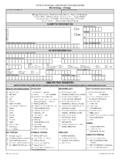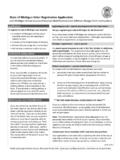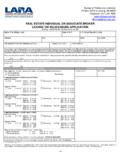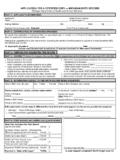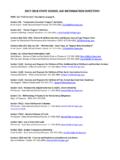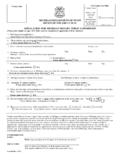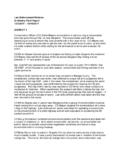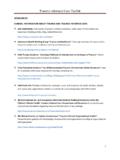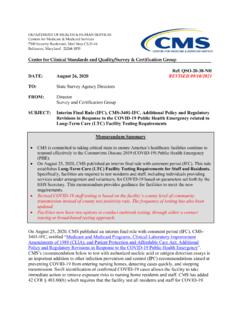Transcription of Think Globally… Report Locally! - Michigan
1 2022: Health Care Professional s Guide to Disease Repor ng in Michigan A summary of the Michigan Communicable Disease Rules Think Report Locally! Version Michigan Department of Health and Human Services 333 South Grand Avenue, Box 30195 Lansing, MI 48909 Communicable Disease Division Phone: 517-335-8165 Fax: 517-335-8263 Immunization Division Phone: 517-335-8159 Fax: 517-335-9855 Bureau of Laboratories 3350 N. Martin Luther King Jr. Blvd. Lansing, MI 48909 Phone: 517-335-8063 Fax: 517-335-9631 After hours Emergency calls only: 517-335-9030 Michigan s Communicable Disease Rules Michigan s communicable disease rules are promulgated under the authority conferred on the Department of Health and Human Services by section 5111 of Act No. 368 of the Public Acts of 1978, as amended, being of the Michigan Compiled Laws.
2 Violations of these laws will be reported to the state of Michigan and may constitute a misdemeanor under MCL For additional reporting requirements regarding HIV and AIDS please refer to MCL et seq. Health care professionals are advised to consult with their local health departments or legal counsel if they have questions about their responsibilities regarding these rules. The Michigan Department of Health and Human Services maintains, reviews, and revises the list of reportable conditions located on pages 6 and 11 at least annually. Please refer to the Michigan Communicable Disease Information website at or contact the Communicable Disease Division at the number below for the most recent list. The Privacy Rule in the Health Insurance Portability and Accountability Act of 1996 (HIPAA) allows for the disclosure of protected health information, without individual client or patient authorization, to public health authorities, who are legally authorized to receive such reports for the purpose of preventing or controlling disease.
3 45 (b) Table of Contents WHY Report COMMUNICABLE DISEASES?..1 LOCAL HEALTH DEPARTMENT SYSTEM AND 2 Michigan LABORATORY RESPONSE A. Authorization and Obligation to 3 1. Physicians and 3 2. Who else may 3 3. Schools, daycares, and 3 B. How, Where, and When to 4 1. Michigan Disease Surveillance System (MDSS).. 4 2. Duplicate 4 3. HIV 4 C. Content of the 5 1. Physician s 5 2. Unusual outbreak or 5 3. Laboratory 5 D. Physician and Authorized Health Care Professional Reporting 6 1. List of reportable diseases by 6 2. Animal bites/rabies 7 3. Influenza 8 4. Pregnancy status reporting and STI 8 E. Expedited partner 8 F. Immunization Requirements and 9 1. Michigan vaccination 9 2. Michigan vaccine 9 3. Reporting to the Michigan Care Improvement Registry (MCIR).
4 9 4. School and childcare immunization G. Laboratory Reporting 11 1. List of reportable diseases by 11 2. Carbapenemase-producing Carbapenem-resistant Enterobacterales (CP-CRE) .. 12 3. Mycobacterium tuberculosis complex reporting and culture 13 4. Rabies examination and 13 5. Viral hepatitis 13 6. Submission of other designated conditions 14 H. Investigative Authority of Public Health 14 1. Access to information .. 14 2. Assistance and 15 3. Validation of 15 4. Information to be 15 5. Authority to .. 15 I. 16 J. Isolation and Other Preventative K. Exclusion from CONSULTATION SERVICE AND 17 IMPORTANT 18 DIRECTORY OF Michigan LABORATORY RESPONSE 19 DIRECTORY OF Michigan LOCAL HEALTH 1 Why Report Communicable Diseases? The public health system depends upon reports of diseases to monitor the health of the community and to provide the basis for preventive action.
5 The prompt required reporting by physicians, laboratory scientists, infection preventionists, and other care providers of both diagnosed and suspected communicable diseases allows for timely action by local and state public health personnel. This teamwork makes possible important benefits, as listed below, for individual patients and the community. 1. Identification of outbreaks and epidemics. The unusual occurrence, outbreak , or epidemic of any disease or condition must be reported to the local health department. The local health department will investigate to identify the source and control the spread of the disease and Report those findings to the Michigan Department of Health and Human Services (MDHHS, also referred to as the Department ). R. (1), (5). Disease-specific surveillance protocols can be found under the Communicable Diseases (A-Z) link at: 2.
6 Enabling preventive treatment and/or education to be provided. Close contacts or sexual partners need to be identified for prophylaxis, treatment, and/or education about how to prevent the spread of some infections . See generally, R. (1). 3. Successful targeting of prevention programs, identification of care needs, and efficient use of scarce prevention resources. Public and private health care funding is scarce. State and local public health authorities and health care providers make difficult choices about what prevention and treatment services will be provided. Communicable disease data help to maximize the impact of these dollars. 4. Evaluation of the success of long-term control efforts. Public health programs need a means of assessing the continued success of control efforts for some diseases.
7 5. Facilitation of epidemiologic research to uncover a preventable cause. For some diseases of unknown etiology, reporting is needed to allow studies of the occurrence of the disease to help find the cause or modifiable risk increasing factors. 6. Assistance with national and international disease surveillance and preparedness efforts. For diseases that are unusual in Michigan , or for those that have the potential to be used as bioterrorism agents, we are part of a national network that the federal government depends on to determine whether national or international investigations are needed. 7. Compliance with Michigan s public health laws. All physicians and laboratories are required by law to Report certain cases of communicable disease. Violations of these laws will be reported to the state of Michigan and may constitute a misdemeanor under MCL ACCURATE AND COMPLETE DISEASE REPORTING IS ESSENTIAL TO THE COMMUNITY S HEALTH 2 Local Health Department System and Services Michigan is served by a system of local public health departments that provide basic public health services, including communicable disease-related services, to all Michigan citizens and health care providers in all areas of the state.
8 Communicable disease reports should be directed to the local health department. The primary role of MDHHS in communicable disease control is to provide expert consultation, reference level diagnostic laboratory services, childhood vaccines, and support as needed to Michigan s local health departments. Local health departments function as administratively autonomous units, separate from MDHHS. As such, they set their own priorities for how they allocate the resources available to them. Most local health departments provide a wide range of communicable-disease-related services. Some of the communicable disease prevention services that are frequently offered include: Communicable disease consultation, including information on testing and specimen requirements, and outbreak investigation Provision of diagnostic, treatment, and partner services for sexually-transmitted infections Immunization clinics Animal bite consultation services Tuberculosis consultation and treatment services The telephone number of your local health department is usually listed on their website and in the phone book with other county services (Note: Detroit is the only city in Michigan that has a city health department).
9 It may be helpful to write your local health department phone number on the cover of this booklet. For a directory of Michigan local public health departments see page 20 of this guide. Michigan Laboratory Response Network The MDHHS Bureau of Laboratories (BOL) is equipped to respond to acts of biological or chemical terrorism, emerging infectious diseases or other public health threats and emergencies. The role of the BOL is to provide rapid identification of etiologic agents, allowing the medical community to provide appropriate prophylaxis and or treatment to minimize morbidity and mortality. The Laboratory Response Network (LRN) is an integrated national network of laboratories that are capable of responding to biological or chemical public health emergencies. Established by the Centers for Disease Control and Prevention (CDC) and the Association of Public Health Laboratories in 1999, the LRN is now a partnership between government and private organizations that have a stake in all public health threat events.
10 The LRN comprises laboratories that follow consensus protocols developed by the CDC and the Food and Drug Administration (FDA). All LRN testing services for the agents of bioterrorism and for emerging infectious diseases in Michigan are performed at the MDHHS BOL in Lansing. Regional public health laboratories located in Kalamazoo, Grand Rapids, Pontiac, and Saginaw provide support to local disease outbreak investigations and possible bioterrorism incidents. They work with local hospital laboratories to facilitate the transport to and testing of specimens at MDHHS. For a directory of the Michigan Regional and LRN reference Laboratories see page 19 of this guide. 3 A. Authorization and Obligation to Report 1. Physicians and laboratories The Department reviews, maintains, and publishes a list of reportable diseases and infections at least annually.
